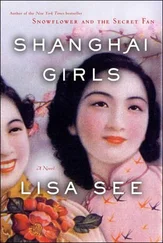Lisa See - Peony in Love
Здесь есть возможность читать онлайн «Lisa See - Peony in Love» весь текст электронной книги совершенно бесплатно (целиком полную версию без сокращений). В некоторых случаях можно слушать аудио, скачать через торрент в формате fb2 и присутствует краткое содержание. Жанр: Старинная литература, на английском языке. Описание произведения, (предисловие) а так же отзывы посетителей доступны на портале библиотеки ЛибКат.
- Название:Peony in Love
- Автор:
- Жанр:
- Год:неизвестен
- ISBN:нет данных
- Рейтинг книги:4 / 5. Голосов: 1
-
Избранное:Добавить в избранное
- Отзывы:
-
Ваша оценка:
- 80
- 1
- 2
- 3
- 4
- 5
Peony in Love: краткое содержание, описание и аннотация
Предлагаем к чтению аннотацию, описание, краткое содержание или предисловие (зависит от того, что написал сам автор книги «Peony in Love»). Если вы не нашли необходимую информацию о книге — напишите в комментариях, мы постараемся отыскать её.
Peony in Love — читать онлайн бесплатно полную книгу (весь текст) целиком
Ниже представлен текст книги, разбитый по страницам. Система сохранения места последней прочитанной страницы, позволяет с удобством читать онлайн бесплатно книгу «Peony in Love», без необходимости каждый раз заново искать на чём Вы остановились. Поставьте закладку, и сможете в любой момент перейти на страницу, на которой закончили чтение.
Интервал:
Закладка:
give to your family. The first—” She peeled back the corners of a silk kerchief that lined a basket and brought out a tiny package also wrapped in silk. Shao lowered her head and held out the bundle cupped in the palms of her hands. “Little Miss intended these for you as a token of filial piety.”
Madame Wu took the package and slowly opened it. She picked up one of the shoes I’d made for her and examined it with a mother-in-law’s shrewd eyes. The peonies I’d embroidered were striking against their deep blue background. Madame Wu turned to her son, and said, “Your wife was very talented with a needle.”
Would she have said that to me if I’d been alive? Or would she have criticized me as a proper mother-in-law should?
Shao reached back into the basket and pulled out my copy of The Peony Pavilion.
Here’s a truth about death: Sometimes you forget things that you once thought were important. I’d asked Shao to bring Volume One to my new home three days after my marriage. She hadn’t done that for obvious reasons, and I’d forgotten about her promise and my project. Even when I’d seen her daughter hiding her embroidery patterns in the folds, I didn’t remember.
After Shao explained that I’d stayed up late at night reading and writing, that my mother had burned my books, and that I’d hidden the volume in my bedclothes, Ren took it in his hands and opened it.
“My son saw the opera, and then he searched the city to find this particular copy,” Madame Wu explained. “I thought it best if my daughter-in-law gave it to your Peony. But this is only part one. Where is the second volume?”
“As I said, the girl’s mother burned it,” Shao repeated.
Madame Wu sighed and pursed her lips in disapproval.
Ren leafed through the pages, stopping here and there.
“Do you see?” he asked, pointing to characters blurred by my tears.
“Her essence glistens on the paper.” He began to read. A few moments later he looked up and said, “I see her face in every word. The ink looks vivid and new. Mother, you can sense her hand’s moisture on the pages.”
Madame Wu regarded her son sympathetically.
I felt sure Ren would read my thoughts about the opera and know what he had to do. Shao would help him by telling him to dot my tablet.
But Shao mentioned nothing about my missing dot, and Ren didn’t look hopeful or inspired in any way. Rather, sadness deepened his features. My pain was so deep I felt as though my heart was shredding.
( 1 1 7 )
“We’re grateful to you,” Madame Wu said to Shao. “In your mistress’s brushstrokes, my son finds his wife. In this way, she continues to live.”
Ren closed the book and abruptly stood. He gave Shao an ounce of silver, which she pocketed. Then, without another word, he stalked out of the room with my book under his arm.
That night I watched him in his library as he sank deeper and deeper into melancholy. He called for servants and ordered wine. He read my words, delicately touching the pages. He held his head, drank, and let tears fall down his cheeks. Distraught at this reaction—this was not at all what I wanted—I looked for Madame Wu and found her in her bedchamber.
We shared the same name and we both loved Ren. I had to believe that she would do whatever she could to ease her son’s mind. In this we had to be
“sames.”
Madame Wu waited until the household grew quiet, and then she padded along the corridor on her lily feet. She quietly opened the door to the library. Ren had put his head down on the desk and fallen asleep.
Madame Wu picked up The Peony Pavilion and the empty bottle of wine, and then she blew out the flickering candle and left the room. Back in her bedchamber, she slipped my project between two folded gaily colored silk gowns that, as a widow, she would never wear again, and closed the drawer.
month s we nt by. Since I couldn’t leave the Viewing Terrace, I saw everyone who stopped here on their journey through the seven levels of the afterworld. I saw chaste widows dressed in layer upon layer of longevity clothes meet their long-dead husbands in joyful reunions and knew that they would be treasured and honored for decades to come.
However, I saw no mothers who’d died in childbirth. They’d gone straight to the Blood-Gathering Lake, a place where women suffered in a perpetual hell for the pollution of their failed childbearing. But for all the others who passed this way, the Viewing Terrace gave the newly dead a chance to say goodbye to those below and at the same time be reminded of what their duties were now as ancestors. From now on, they would return to this spot to look down on the world, weigh how their descendants were doing, and then grant wishes or send punishments. I saw angry ancestors, who taunted, teased, or humiliated those left behind; I saw other ancestors—plump with offerings—reward their families with plentiful harvests and numerous sons.
( 1 1 8 )
But for the most part I watched the newly dead. None of them knew yet where they would end up once they passed through all seven levels.
Would they be sent to one of the ten yamens with all its different hells?
Would they wait hundreds of years before being allowed to return to earth and inhabit another body? Would they be reincarnated quickly, as educated men if they were lucky, or transmigrated into a woman, a fish, or a worm if they weren’t? Or would Guanyin whisk them to the Western Par-adise, ten thousand million li from here, where they would escape all further rebirths and spend the rest of eternity in a blissful haven of everlasting happiness, feasting, and dancing?
Some of the other lovesick maidens I’d heard about when I was alive came to meet me: Shang Xiaoling, the actress who died onstage; Yu Niang, whose death inspired Tang Xianzu to write poems eulogizing her; Jin Fengdian, whose story was almost identical to mine, except that her father had been a salt merchant; and a few others.
We commiserated. In life, we had all known the danger that emanated from the opera’s pages—reading it, reading anything, could be fatal—but we’d each been bewitched by the allure of dying young, beautiful, and talented. We were seduced by the pain and pleasure of contemplating the other lovesick maidens. We read The Peony Pavilion, we wrote poems about it, and we died. We thought our writing would live beyond the ravages of time and the decay of our bodies, thereby proving the power of the opera.
The lovesick maidens wanted to know about Ren, and I told them I believed two things: first, Ren and I were a match made in Heaven; second, qing would bring us back together.
The girls looked at me pityingly and murmured among themselves.
“We all had dream lovers,” the actress finally confided, “but that’s all they were—dreams.”
“I believed my scholar was real too,” Yu Niang admitted. “Oh, Peony, we were just like you. We had no say in our lives. We were all to be married to husbands unknown into families unknown. We had no hope for love, but we longed for it. What girl doesn’t meet a man in her dreams?”
“Let me tell you about my love. In my dreams, we used to meet at a temple. I loved him very much,” said another of the girls.
“I too thought I was like Liniang,” the salt merchant’s daughter added.
“I expected that after I died my young man would find me, fall in love with me, and bring me back to life. We would have real love, not obligation or duty love.” She sighed. “But he was just a dream, and now here I am.”
( 1 1 9 )
I looked from pretty face to pretty face. Their sad expressions told me that they each had nearly identical stories.
“But I actually met Ren,” I said. “He touched me with a peony blossom.”
Читать дальшеИнтервал:
Закладка:
Похожие книги на «Peony in Love»
Представляем Вашему вниманию похожие книги на «Peony in Love» списком для выбора. Мы отобрали схожую по названию и смыслу литературу в надежде предоставить читателям больше вариантов отыскать новые, интересные, ещё непрочитанные произведения.
Обсуждение, отзывы о книге «Peony in Love» и просто собственные мнения читателей. Оставьте ваши комментарии, напишите, что Вы думаете о произведении, его смысле или главных героях. Укажите что конкретно понравилось, а что нет, и почему Вы так считаете.












